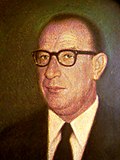Background
During Mario Echandi's presidency Rafael Angel Calderón, his family and supporters in exile, were allowed to return and a general amnesty was called for everyone involved in the still recent Civil War of 1948. [3] Calderón was elected Congressman in the 1958 election. But meanwhile in the past election the National Liberation Party was split due to the separation of the “Rossist” faction in this election Calderon's candidacy unified PLN and other political allies into a strong anti-Calderonist ballot. [3]
Both former presidents Otilio Ulate from National Union and Calderón himself from National Republican became candidates. PLN's candidate was, as in 1958, Francisco Orlich, one of the party's founder, commander of one of the fronts during the civil war and Figueres’ close friend. [3]
A fourth small left-wing party named Popular Democratic Action led by socialist thinker Enrique Obregón also took part in the election nominating Obregon. [3] Communism was illegal according to the Constitution and Marxist Parties were not allowed, but Obregon's party was officially socialist so the prohibition was not endorsed. Even so, Obregón did have the support of the traditional leadership and militancy of the (outlawed) Communist Party. [3]
This page is based on this
Wikipedia article Text is available under the
CC BY-SA 4.0 license; additional terms may apply.
Images, videos and audio are available under their respective licenses.







